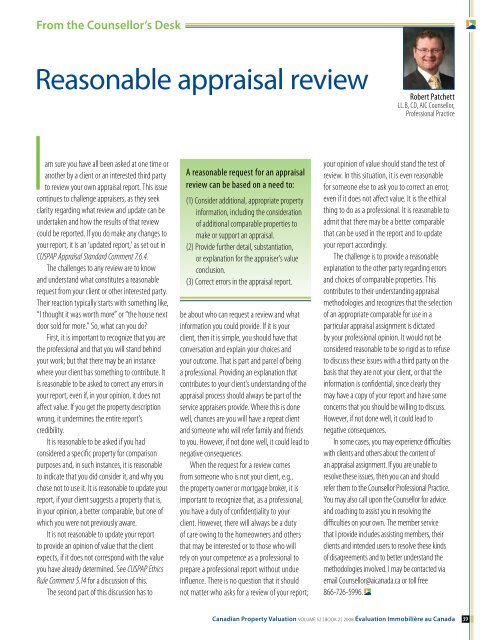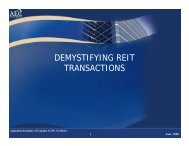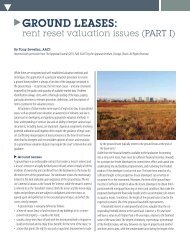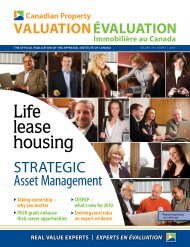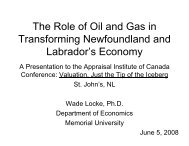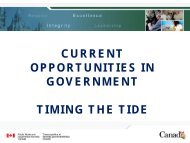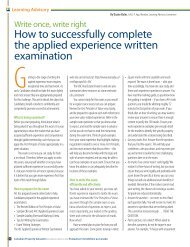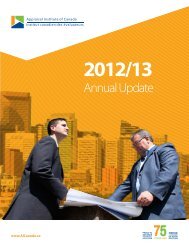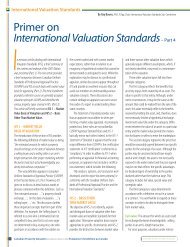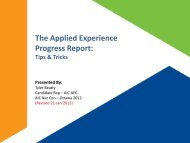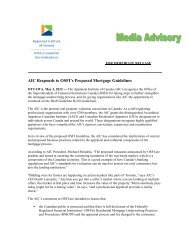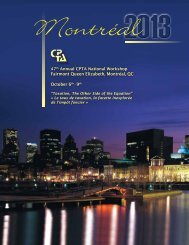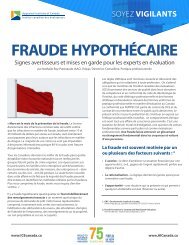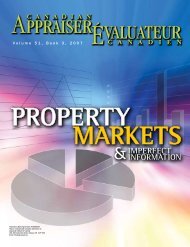Book 2 - Appraisal Institute of Canada
Book 2 - Appraisal Institute of Canada
Book 2 - Appraisal Institute of Canada
Create successful ePaper yourself
Turn your PDF publications into a flip-book with our unique Google optimized e-Paper software.
From the Counsellor’s Desk<br />
Reasonable appraisal review<br />
Robert Patchett<br />
LL.B, CD, AIC Counsellor,<br />
Pr<strong>of</strong>essional Practice<br />
Iam sure you have all been asked at one time or<br />
another by a client or an interested third party<br />
to review your own appraisal report. This issue<br />
continues to challenge appraisers, as they seek<br />
clarity regarding what review and update can be<br />
undertaken and how the results <strong>of</strong> that review<br />
could be reported. If you do make any changes to<br />
your report, it is an ‘updated report,’ as set out in<br />
CUSPAP <strong>Appraisal</strong> Standard Comment 7.6.4.<br />
The challenges to any review are to know<br />
and understand what constitutes a reasonable<br />
request from your client or other interested party.<br />
Their reaction typically starts with something like,<br />
“I thought it was worth more” or “the house next<br />
door sold for more.” So, what can you do?<br />
First, it is important to recognize that you are<br />
the pr<strong>of</strong>essional and that you will stand behind<br />
your work; but that there may be an instance<br />
where your client has something to contribute. It<br />
is reasonable to be asked to correct any errors in<br />
your report, even if, in your opinion, it does not<br />
affect value. If you get the property description<br />
wrong, it undermines the entire report’s<br />
credibility.<br />
It is reasonable to be asked if you had<br />
considered a specific property for comparison<br />
purposes and, in such instances, it is reasonable<br />
to indicate that you did consider it, and why you<br />
chose not to use it. It is reasonable to update your<br />
report, if your client suggests a property that is,<br />
in your opinion, a better comparable, but one <strong>of</strong><br />
which you were not previously aware.<br />
It is not reasonable to update your report<br />
to provide an opinion <strong>of</strong> value that the client<br />
expects, if it does not correspond with the value<br />
you have already determined. See CUSPAP Ethics<br />
Rule Comment 5.14 for a discussion <strong>of</strong> this.<br />
The second part <strong>of</strong> this discussion has to<br />
A reasonable request for an appraisal<br />
review can be based on a need to:<br />
(1) Consider additional, appropriate property<br />
information, including the consideration<br />
<strong>of</strong> additional comparable properties to<br />
make or support an appraisal.<br />
(2) Provide further detail, substantiation,<br />
or explanation for the appraiser’s value<br />
conclusion.<br />
(3) Correct errors in the appraisal report.<br />
be about who can request a review and what<br />
information you could provide. If it is your<br />
client, then it is simple, you should have that<br />
conversation and explain your choices and<br />
your outcome. That is part and parcel <strong>of</strong> being<br />
a pr<strong>of</strong>essional. Providing an explanation that<br />
contributes to your client’s understanding <strong>of</strong> the<br />
appraisal process should always be part <strong>of</strong> the<br />
service appraisers provide. Where this is done<br />
well, chances are you will have a repeat client<br />
and someone who will refer family and friends<br />
to you. However, if not done well, it could lead to<br />
negative consequences.<br />
When the request for a review comes<br />
from someone who is not your client, e.g.,<br />
the property owner or mortgage broker, it is<br />
important to recognize that, as a pr<strong>of</strong>essional,<br />
you have a duty <strong>of</strong> confidentiality to your<br />
client. However, there will always be a duty<br />
<strong>of</strong> care owing to the homeowners and others<br />
that may be interested or to those who will<br />
rely on your competence as a pr<strong>of</strong>essional to<br />
prepare a pr<strong>of</strong>essional report without undue<br />
influence. There is no question that it should<br />
not matter who asks for a review <strong>of</strong> your report;<br />
your opinion <strong>of</strong> value should stand the test <strong>of</strong><br />
review. In this situation, it is even reasonable<br />
for someone else to ask you to correct an error,<br />
even if it does not affect value. It is the ethical<br />
thing to do as a pr<strong>of</strong>essional. It is reasonable to<br />
admit that there may be a better comparable<br />
that can be used in the report and to update<br />
your report accordingly.<br />
The challenge is to provide a reasonable<br />
explanation to the other party regarding errors<br />
and choices <strong>of</strong> comparable properties. This<br />
contributes to their understanding appraisal<br />
methodologies and recognizes that the selection<br />
<strong>of</strong> an appropriate comparable for use in a<br />
particular appraisal assignment is dictated<br />
by your pr<strong>of</strong>essional opinion. It would not be<br />
considered reasonable to be so rigid as to refuse<br />
to discuss these issues with a third party on the<br />
basis that they are not your client, or that the<br />
information is confidential, since clearly they<br />
may have a copy <strong>of</strong> your report and have some<br />
concerns that you should be willing to discuss.<br />
However, if not done well, it could lead to<br />
negative consequences.<br />
In some cases, you may experience difficulties<br />
with clients and others about the content <strong>of</strong><br />
an appraisal assignment. If you are unable to<br />
resolve these issues, then you can and should<br />
refer them to the Counsellor Pr<strong>of</strong>essional Practice.<br />
You may also call upon the Counsellor for advice<br />
and coaching to assist you in resolving the<br />
difficulties on your own. The member service<br />
that I provide includes assisting members, their<br />
clients and intended users to resolve these kinds<br />
<strong>of</strong> disagreements and to better understand the<br />
methodologies involved. I may be contacted via<br />
email Counsellor@aicanada.ca or toll free<br />
866-726-5996.<br />
Canadian Property Valuation Volume 52 | book 2 | 2008 Évaluation Immobilière au <strong>Canada</strong> 39


